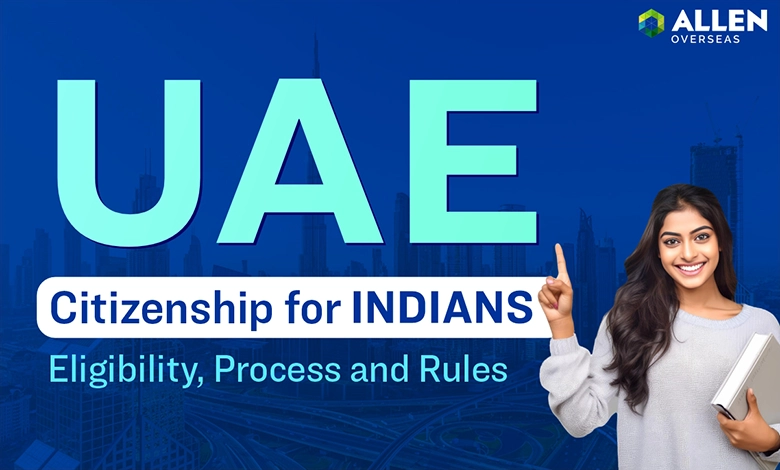- Call Us :
- Mail Us :
- Request a Call



UAE is home to over 3.5 million Indians, and so the question of “Can Indians get UAE citizenship?” is being asked more frequently than ever. Some recent changes in UAE laws have introduced selective but concrete opportunities—especially for those with exceptional skills or contributions.
Whether you’re a professional, parent, or student with aspirations in the Emirates, this blog will help you understand how UAE citizenship for Indians is evolving in 2025.
UAE citizenship for Indians is possible under four specific routes, but it remains highly selective and largely nomination-based. Here’s a breakdown:
While UAE Golden Visa has gained popularity, it’s crucial to understand:
Step 1: Check Eligibility Before You Apply
Before starting your application, make sure you meet the UAE citizenship eligibility criteria. This typically includes:
Once these conditions are fulfilled, you can begin by filling out the official forms provided by relevant UAE government entities.
Step 2: Prepare and Submit the Required Documents
Applicants must submit a well-organized set of documents, including:
Additionally, a recommendation letter may be required from recognized UAE institutions such as the Rulers’ Courts, Crown Princes’ Courts, or the Ministry of Economy.
Step 3: Application Review and Background Check
Once your application is submitted, UAE authorities will conduct a thorough review and verification process. This may include:
All final approvals are made by the UAE Cabinet, making this a highly selective and prestigious process.
Step 4: Take the Oath of Allegiance
If your application is approved, you will be invited to take a formal Oath of Allegiance to the United Arab Emirates. This step reflects your commitment to:
Step 5: Receive UAE Citizenship and Its Exclusive Benefits
Once you take the oath, you will officially become a UAE national and receive a UAE passport. Citizenship comes with several exclusive benefits, including:
While UAE citizenship or long-term residency sounds appealing, many Indians fall into avoidable traps. Here’s what to steer clear of:
Only UAE government authorities can grant citizenship—not private agents. Avoid anyone promising “guaranteed citizenship” for a fee.
Use only authorized Golden Visa service providers (e.g., VFS Global, Rayad Group). Never pay upfront without official documentation.
UAE does not offer citizenship for sale. Golden Visas require investment but don’t grant passports or voting
Missing notarizations, non-Arabic translations, or outdated certificates can get your application rejected. Always follow the official checklist.
Get your documents attested in both India and the UAE. PCCs, educational records, and proof of achievements must be valid and clear.
UAE citizenship is nomination-based—not open to the public. If you’re not an inventor, scientist, artist, etc., focus on Golden Visa instead.
UAE can revoke citizenship or visa if laws are broken. Stay compliant, avoid political issues, and maintain financial/legal discipline.
Though still selective, UAE citizenship for Indians is no longer an impossible dream. Through exceptional merit, federal nominations, or the India-specific Golden Visa, high-achieving NRIs now have real, structured pathways to settle permanently in the UAE. For most, the Golden Visa offers the best starting point—with citizenship a potential future milestone for the deserving.
If you’re an NRI parent or student aiming for long-term success in the UAE, stay updated on official announcements and other information before applying.
No. UAE citizenship is not open for public application. It is granted by nomination only, typically to individuals with exceptional contributions in fields like science, medicine, arts, or innovation.
No. UAE does not offer citizenship for sale. However, investors may be eligible for the UAE Golden Visa, which is a long-term residency—not citizenship.
Only in exceptional merit cases where UAE allows dual citizenship. However, India does not allow dual citizenship, so you may need to give up your Indian passport if granted UAE citizenship.
The Golden Visa is a renewable long-term residency (5–10 years or lifetime for Indians in 2025). It allows living and working in the UAE but does not grant citizenship rights such as voting or an Emirati passport.
For citizenship: It depends. Some exceptional merit-based citizens may have the option to sponsor family later.
For Golden Visa: Yes, you can sponsor your spouse and children under the same residency permit.
Yes, especially for naturalization-based applicants. It may not be required for exceptional merit nominations, but knowing Arabic strengthens your case.
Use only UAE’s official website https://u.ae or authorized agencies like VFS Global, Rayad Group, and One Vasco.
UAE legislation typically does not recognize dual nationality. Those who obtain UAE citizenship are generally expected to renounce their original citizenship. However, there have been instances where exceptions are made, but such cases are usually subject to the discretion of the UAE government.
Our Support
Copyright © 2025 Allen Overseas. All Rights Reserved.